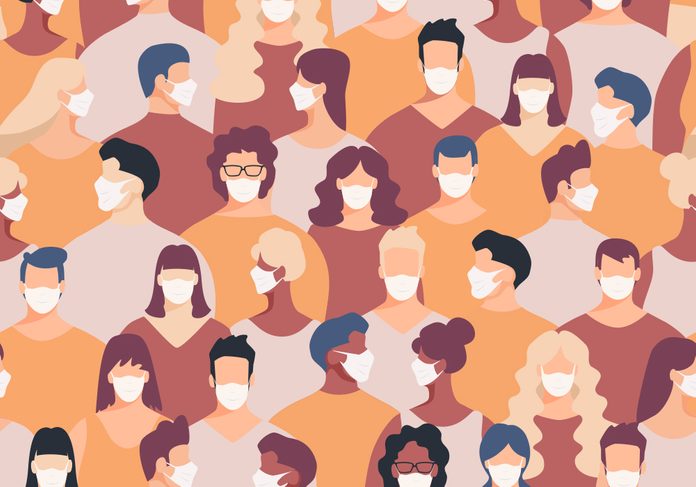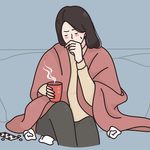What We Should Take Away From The Year of Covid

Hannah Sung talks to U of T’s Madeleine Mant about what we can’t forget going into the final stretch.
For all the news on the Moderna, Pfizer and Astra-Zeneca vaccines, the biggest question for most people is simply, “When?”
The good news for our family is that my parents are scheduled to get their first shots this weekend (hallelujah, high five to the jab lab!). But what about the almost 90% of Canadians who have not yet received a first shot? It’s like waiting in line forever for a rollercoaster and finally climbing in, tick-tick-ticking up to the highest ascent.
Meanwhile, outside it’s spring. The buds are out, the littlest flowers have bloomed and restaurant dining is open. People are mingling as Covid cases increase in our third wave. Experts are saying people will need to go back to stricter shutdown measures but it’s going to be like trying to stuff a genie back in a bottle. The genie wants to see friends and go shopping.
Where I am, in Ontario, we are losing the race between vaccines and the variants. And everything we’re learning about the new variants (they are deadlier and more harmful meaning a more dangerous third wave) it’s easy to feel panicked.
So I called up someone who could talk big picture, like, really big picture, by imparting what she knows about the history of contagious infections.
Madeleine Mant is a medical anthropologist at University of Toronto-Mississauga. She studies “bodies through time,” meaning that she wants to know what life was like for people who experienced poor health in the past, especially overlooked or vulnerable people.
“Right now, we have a chance to ask living people the questions I always wish I could ask the dead ones when I’m looking at hospital records or at skeletons, thinking, Oh, what was that day like? What were those experiences like?” Mant told me from her home office.
By living through a pandemic herself, Madeleine’s professional and personal experience has collided.
I asked her about what we’ve seen so far, the final stretch and her hopes for how we’ll move forward from this time.
(Related: How to Talk to Your Loved Ones About the COVID-19 Vaccines)
Any surprises with how we’ve handled Covid so far?
“No, I’m not surprised. If you look at infectious disease outbreaks in the past, they tend to reveal the societal fault lines that were already there. When we talk about the Black Death in the 14th century, folks were rounding up Jewish people and setting them on fire, saying they’re poisoning the wells, that’s how this is spreading. Sex workers during the First and Second World Wars — incredible amounts of propaganda were put out against them, and these were often women that had been forced into this, or using sex as a means of survival, right? So we see blame and shame get laid down in every epidemic.
I was disturbed and horrified by how quickly the anti-Asian rhetoric exploded back in March. But I wouldn’t say that I was surprised.”
On anti-masking:
“The anti-masking demonstrations we see now were also happening in 1919 in San Francisco — there was the Great Anti-Mask League. So that is not new. When vaccination was really popularized in the 18th century, there were political cartoons drawn where people were getting the vaccination and turning into cows, because the vaccine was drawn from cowpox. You know, “vaccination” the word, comes from “vacca” for cow. And I always wonder, did they really believe it? Or were they just sort of saying that crossing animals and humans is an unholy kind of thing?
We see people that are resistant to believe new science. People were really upset over the changing narrative coming from Canada Health last year about masks. But science can update. So again, I’m not surprised. I’m just sort of stunned to be living through this.”
(Related: What You Need to Know About Canada’s New Three-Layer Face Mask Guideline)
How do you feel about this final stretch moment we’re in?
“We can see the light at the end of the tunnel. But we can’t forget that the pandemic is still raging. The weather’s getting better, people are saying, I can’t wait to get back out on the patios. But we need to remain vigilant. We need to remember that even if we get the shot, we’re still not sure if we can still transmit the virus, even if we’ve been vaccinated. So until we know that, it’s going to be critical to wear masks.”
What are mistakes we should learn from in the past?
“Cutting funding to public health agencies is a major one. Also, employing fewer frontline workers, like nurses. And we don’t want to open up the closet and find emergency stores have been depleted. There was a lot of that going on here. We just weren’t prepared.
And the biggest thing for me is that we need to continue to root out systemic racism. We need to talk about why we need to point fingers. This is a natural human thing, it has happened for thousands of years when it comes to infectious diseases. But looking at the news of what happened in Atlanta, I am horrified. And the idea that some people don’t want to connect this to be a racial thing is so obviously incorrect.”
(Related: How Are Canadian Caregivers Handling COVID?)
On protecting vulnerable people in a time of climate crisis
“Pandemics are going to keep happening because of climate change. We can’t just say, Thank goodness the scientists fixed this one with a great shot in the arm. We need to put our resources to deal with climate change, as biodiversity is changing, as animals are moving closer to cities because their habitats are being broken down.
There’s a term: ecosyndemics. It basically means the interaction and synergy between infectious disease and the environment. Many experts kept saying this pandemic was coming and here it is. But it’s an opportunity to really look inward and think about how we can be better prepared. We have to think about the larger picture in terms of protecting people that are most vulnerable.
The flu pandemic of 1918 helped drive the founding of the Canadian federal health agencies. So let’s talk about how we can use the incredible knowledge and communication abilities we have to do better and do right by the people that have been pushed to the margins.”
How she feels right now
“I feel incredibly hopeful. I am so impressed with the engagement with science. I’ve been impressed with the stalwartness of the students that I teach. I am impressed with families that have made these incredible sacrifices to stay distant to save lives. The idea of people saying, I don’t have any grandparents, but I don’t want to hurt yours, I’m gonna stay home. That kind of generosity of spirit is absolutely amazing. And it outweighs any of the negativity that’s out there. But we can’t ignore the negativity while we remain hopeful.
I feel great, the sun is shining, things are going to be wonderful. But to stay physically distant, while remaining socially connected, is going to be really, really important. And I hope that we learn a lesson and fund mental health and public health. Because what we’re seeing is a huge spike in eating disorders and mental health problems. And that is because, you know, we are not used to being apart. We are such a social species. But we can and will rebuild and I’m just so excited to get beyond this so we can look back on it.”
Hannah Sung’s column appears monthly(ish) on Best Health. It’s adapted from her (excellent) newsletter, At The End Of The Day. If you’re interested in reading more, sign up for it down below or click here.
Next, here’s Hayley Wickenheiser on what working at the frontlines this past year has been like.




